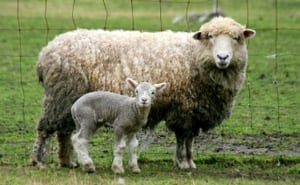Lambing season
by Kristin Vogel, PCC Farmland Trust Communications Manager
This article was originally published in February 2012
When all appears at its most fallow and most gray, that’s when you know, deep in the ground, nature is plotting her riotous greening. Above ground, farmers page through seed catalogs, steaming coffee at hand, planning out their courses of action. Bright red tractors sit idle in barns, repaired and ready to go. Sheds and barns are quiet under blankets of snow, and pigs pile atop one another, cozy and snorting on their beds of straw.
And then: the first lambs appear.

In our 2011 Annual Campaign letter, we introduced you to Gary and Lois Fisher, owners of Camelot Downs Farm on Whidbey Island. The Fishers donated a conservation easement on their property to PCC Farmland Trust, ensuring that Camelot Downs will stay an organic farm in perpetuity, and protect it from any future development.
Camelot Downs is a pretty magical place — and it is a prime location for appreciating the first signs of spring. When we held a tour there last February, we witnessed many captivating scenes of mother sheep tending their shaky-legged toddling lambs. Protective and a bit wary, the ewes kept their little ones close, but we all got to wander up and down the green expanses of field with the flock. We watched the lambs explore their fresh new worlds, kicking up their hoofs in spirited bursts of play, only to return to their mothers’ sides at the command of a stern “bleehhhhhh!”
Gary and Lois Fisher make it their mission to educate the public about heritage animals. In particular, the Fishers raise colonial animals — breeds traditionally bred in the U.K. prior to industrialization. Like many other casualties of modern industrial agricultural practices, colonial animal breeds are not suited to mass production or confined feedlots, and are vanishing as a result.
In addition to the Southdown and Romney sheep, Camelot Downs hosts Grey Call and Rouen ducks; Ancona, Minorca, and Orpington chickens; two guard llamas; a “Henney” (a cross between a horse and a donkey); and three happy colonial breed dogs, including a Mastiff and Plott Hound.
We are pleased to announce another tour of Camelot Downs next month. The tour will be an opportunity to see this year’s lambing season, and to learn more about PCC Farmland Trust’s eighth (of nine) preserved farms.
Come celebrate the arrival of spring with us on March 24 on Whidbey Island. The tour will be led by Gary Fisher and we’ll learn all about the sustainable innovation taking place on the farm, and meet the colonial breed animals, including the newest baby lambs. This tour is a first-come, first-served opportunity with a limited number of participants. Please call the Farmland Trust at 206-547-9855 to reserve your space. See you on the farm!
